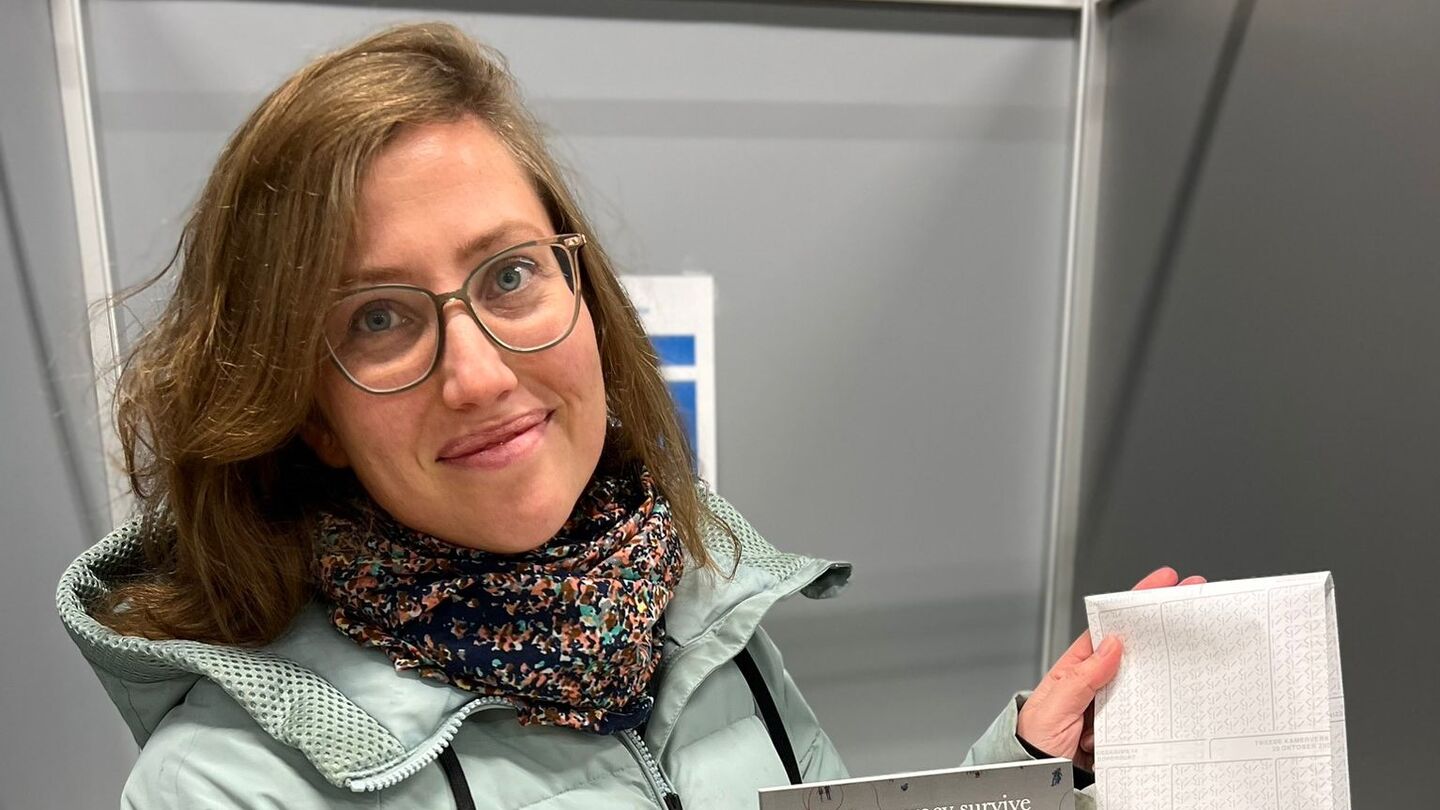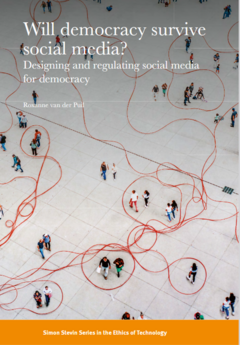
Home stretch | How to protect democracy from social media
Roxanne van der Puil on #facts, emotion, and connection — democracy in the age of algorithms
The recent election campaign once again showed that social media have become indispensable in the fight for voters — but they also pose a threat to our democracy. TU/e philosopher Roxanne van der Puil argues that the focus is too heavily on truth and facts. She advocates for more online depth and connection to counter disinformation and polarization. “We need to move beyond all the shouting and scrolling and start truly listening to each other again.”
Walk down the street, and you hear a variety of people and opinions. Ideally, a visit to an online platform should feel the same way, van der Puil says. The applied ethicist has spent the past four years at TU/e’s Philosophy & Ethics research group studying how the relationship between democracy and social media can be improved. On Tuesday, November 4, she will defend her PhD at the Department of Industrial Engineering & Innovation Sciences.
Polarized camps
“The relationship between democracy, social media, and technology is quite complex,” she explains. “That makes it difficult to pinpoint exactly how social media influence elections.” By examining it from a philosophical perspective, van der Puil hopes to offer a first step toward making social media more balanced.
“Online political discussions escalate quickly, and you often see two opposing camps form. You’re either strongly for or strongly against,” she says. And that’s unusual, van der Puil adds. “In the real world, there are many shades of gray between black and white, but on social media platforms like X and Facebook, those shades are largely missing.”
To foster nuance, van der Puil argues that we first need to carefully examine the concept of democracy itself. “Philosophers have many different ideas about it, all reasonable and plausible,” she says. “Some say democracy is about freedom, others focus on the protection of minorities, or the processes that safeguard human rights. Equality. Autonomy. Inclusion. In short, democracy is a rich and multifaceted concept.”
That diversity is largely absent from current efforts to make social media more democratic, van der Puil says. “We’re too fixated on protecting ‘the truth’ and neglect other democratic values like equality and participation.”
Lifelike AI images
“That doesn’t mean we can’t have a stable foundation to rely on,” van der Puil adds. The conversation briefly turns to the recent circulation of defamatory AI-generated images by two PVV parliamentarians. “These lifelike images make it increasingly difficult for users to distinguish real from fake.”
This is exactly what Nobel laureate Maria Ressa has been warning about for years — social media being used to manipulate public opinion and undermine democracy, van der Puil nods in agreement. “Without facts, you can't have truth. Without truth, you can't have trust. Without all three, we have no shared reality, and democracy as we know it... is dead.”
Shades of gray
What is truth? What counts as fake news? How are people misled? Van der Puil emphasizes that these are important questions to keep asking. “We definitely need to look at how information can be cleaned up online. But we mustn’t overlook subjective experiences. I think it’s crucial to consider all those shades of gray.”
“Our world is more than just facts,” she continues. Democratic values like equality, inclusivity, and empathy should also guide solutions for protecting democracy from the influence of social media.
Van der Puil believes that these shades of gray can help counter mis- and disinformation and reduce polarization. The more perspectives come together, the richer and deeper the debate can be, she says. With a smile, she adds, “It’s no coincidence that the truth is often found in the middle.”
Smaller-scale conversations
She also stresses that broader philosophical ideas about democracy should inform the design of better platform rules and legislation. “Take algorithms, for example. Emotional posts stand out and reach a larger audience. That means users who repeatedly post offensive content have much more influence on the online debate. That doesn’t align with a democracy where citizens are treated equally.”
“We urgently need more online depth and connection,” van der Puil concludes. “Right now, the emphasis is still on quantity — shout, shout, scroll, scroll — but we need to return to quality as quickly as possible. Instead of endless threads, platforms could be designed to encourage smaller, more meaningful conversations. There’s more to online life than broadcasting.”
“Seek out connection, even online. Talk to friends, neighbors, strangers. What do you think? Why do you feel that way? Only by truly listening to each other can we begin to understand one another.”
PhD in the picture
What’s on the cover of your dissertation?
“We show, in an abstract way, how the physical and digital worlds — and the people in them — are interconnected. Through red ‘digital’ threads, but also as little islands in a square. It’s an invitation for the reader to reflect on that.”
You’re at a birthday party. How do you explain your research in one sentence?
"I study how we can protect democracy on online platforms,” she says, sighing. “People often want to talk about very specific topics, like Andrew Tate or migration. But I have to disappoint them. I’ve analyzed responses from scholars, platforms, and policymakers through a broad philosophical lens.”
How do you blow off steam outside of your research?
“During my PhD, our son Emmett was born. When I come home, I’m fully present for him. Young children are so curious — ‘Why? Why?’ — and they haven’t yet developed prejudices. It would be wonderful if we could see that childlike curiosity more in the online world; it’s incredibly connecting.”
What tip would you have liked to receive as a beginning PhD candidate?
“That it’s okay not to know exactly what you’re researching in your first year. At the start of those four years, you have no idea what your path will look like. Take the time to explore, go from left to right, and then back again.”
What’s your next chapter?
“I’ve been working for a while at Sira Consulting, a small research and advisory firm. We conduct studies for the Dutch government at various stages of the policy cycle on diverse topics such as youth care, digitalization, and hazardous materials. I really wanted to continue doing research, but closer to practical application.”


Discussion